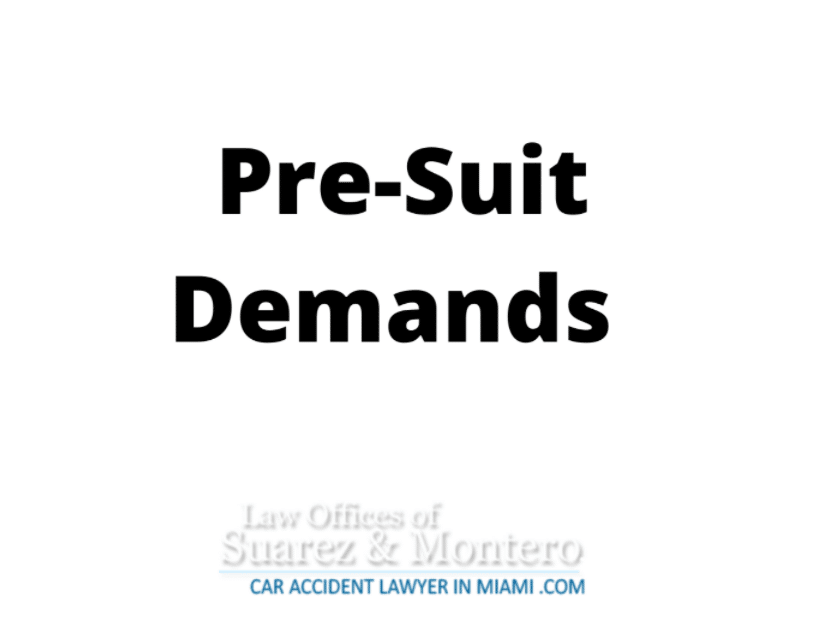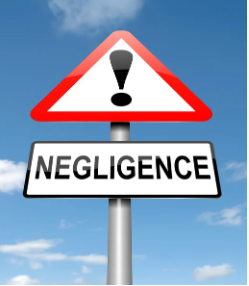
Pre-Suit Demands
Fla. Stat. 627.736(10) states that an insured or in some cases a provider must serve an insurance company with a demand letter as a “condition precedent” to filing suit for personal injury protection benefits. A condition precedent is a legal term that simply refers to an action that one must take before filing suit. Failure to comply with a condition precedent can sometimes lead to your case being dismissed. In this blog post, we will provide an overview on pre-suit demand letters in the context of personal injury protection claims by explaining what a demand letter actually is and what it needs to contain in order to be in compliance with Florida law. You might be wondering, what is a demand letter and what are you supposed to be demanding? To begin, a demand letter essentially provides notice to your insurance company that if they do not compensate you for your injuries, a lawsuit will be filed. It also contains essential information about your claim and benefits that you believe you are entitled to under your policy. In Florida, there are laws that list specifically what a demand letter must contain and when it should be sent to an insurance carrier. For example, a demand letter may not be sent to an insurance carrier until the claim is “overdue”. Generally, a claim is overdue after an insurance company has had an opportunity to review your medical bills and makes a determination of coverage—whether it be an underpayment or an outright denial.
Elements of a Demand Letter
Florida law requires a demand letter to have several elements. We will now address each element in turn below:
Name of Insured Upon Which Benefits are Being Sought: The first requirement is pretty simple and easy to comply with. A demand letter should identify the name of the insured. The reason is to provide the insurer with a means of readily locating the claim and identifying what policy the claim is related to. While I am not aware of any cases invalidating a demand letter solely based on an incorrect or missing insured name, it is best to get it right the first time to avoid confusion.
Claim Number and Policy Number: This is common sense. provides that the Plaintiff’s demand letter should identify “the claim or policy number upon which the claim was originally submitted to the insurer.” Again, the intent is to provide the insurer with a means of readily locating the claim and identifying what policy the claim is related to. Names of Medical Providers Who Rendered Treatment to Insured Including: A demand letter must include the name of any medical provider who rendered treatment, services, accommodations, or supplies that form the basis of the insureds claim.
Itemized Statement Specifying Each Amount, the Date of Treatment, Service or Accommodation, and the Type of Benefit Due:
This is a relatively common-sense provision that the demand should sufficiently identify the medical providers whose charges are being claimed by the demand so that the insurer can identify and pay them. Some insurance companies have suggested that the provision also would require that for claims (such as hospital claims), the claimant would be required to identify the name of each physician and person rendering treatment. In my opinion, that grossly stretches what appears to be the plain intent of this element of a demand letter—which is to give the insurer sufficient information to identify and pay the claim before a suit is filed. In my experience, most litigation based on demand letter disputes centers around this element because if the insurance carrier can prove that the demand letter failed to put them on notice of what benefits needed to be paid and to who, they can sometimes get out of having to make those payments When a careless individual or business is the source of any harm to you or someone you love; it is well within your legal rights as a victim to demand that the responsible party or parties compensate you for your injuries and other damages. Sadly, the process of obtaining compensation from the at fault party is usually easier said than done. For most non-lawyers, it is often difficult to figure out what needs to get done after being injured in any type of accident. If you or someone you love underwent injuries in an accident produced by another person’s negligence, you might feel irritated, discouraged, or worried. Although you may feel this way, it is important for you to know that you may be able to recover compensation for your injuries and expenses.
Car Accident Attorneys in Miami
Our personal injury firm has successfully helped victims recover compensation for over 20 years in South Florida. Our attorneys can help you with your claim during all phases including pre-suit process and litigation. We have a dedicated litigation team with the financial means to help you go up against an insurance company. If you were recently injured in a car accident and sustained injuries, consider retaining a car accident attorney to help you. If you want to talk about your accident and get some legal advice as to how to proceed or want to hire a car accident lawyer to begin working on your personal injury claim, we are here 24/7 for you!. An experienced and skilled car accident lawyer can help obtain a favorable resolution of your case. At our firm, our policy is that if you don’t recover compensation, you won’t pay any fees for our services. Not to mention, we also provide free case consultations where we assess the circumstances surrounding your case and give you an objective overview of what steps you can take going forward if you decide to act against the party responsible for your injuries. Our attorneys are ready to provide proven legal representation and stand ready to protect your rights. We are available 24/7 to give you a free, no risk case consultation! We serve clients throughout Florida including those in the following areas:
Miami-Dade: Aventura, Coral Gables, Doral, Fontainebleau, Hialeah, Homestead, Kendall, Miami, Miami Beach, Miami Lakes, North Miami, Tamiami, and Westchester.
Broward: Fort Lauderdale, Hallandale Beach, Hollywood, Pembroke Pines, and Weston; and Palm Beach County including Boca Raton, Lake Worth, and West Palm Beach.





